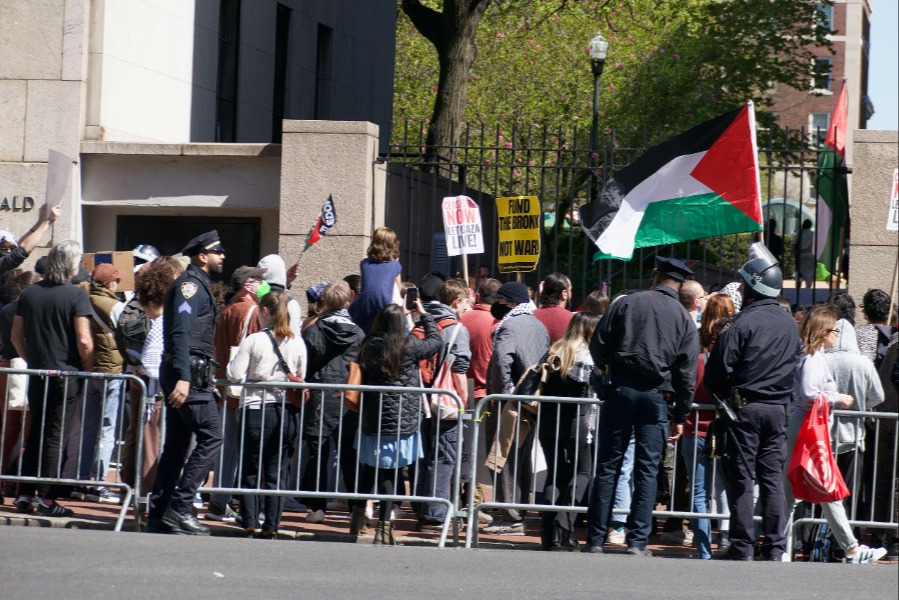Recreating Old Loopholes: Thoughts on the Revised Guidance for Federal Law Enforcement
Earlier this month, the Justice Department issued revised Guidance for Federal Law Enforcement Agencies on the Use of Race, Ethnicity, Gender, National Origin, Religion, Sexual Orientation, or Gender Identity. The prior version---issued in June 2003---didn’t cover profiling on the basis of religion or national origin, and exempted national security and border investigations altogether.
Published by The Lawfare Institute
in Cooperation With

Earlier this month, the Justice Department issued revised Guidance for Federal Law Enforcement Agencies on the Use of Race, Ethnicity, Gender, National Origin, Religion, Sexual Orientation, or Gender Identity. The prior version---issued in June 2003---didn’t cover profiling on the basis of religion or national origin, and exempted national security and border investigations altogether. While the revision broadens the list of traits officials broadly must not rely upon, it adds new, potentially rule-eating, exceptions---and thus does little to constrain the government’s power and to safeguard civil liberties. The premise of the Guidance is unchanged: Biased law enforcement practices “are unfair, promote mistrust of law enforcement, and perpetuate negative and harmful stereotypes;” they are, moreover, “ineffective.” Also in keeping with the previous Guidance, the revision maintains a two-tier structure---with one set of rules for “routine or spontaneous law enforcement decisions, such as ordinary stops,” and another for all other forms of federal law enforcement activity. National security and intelligence investigations are shoehorned into the latter bucket in ways that recreate old loopholes. Indeed, the latest Guidance arguably gives federal law enforcement agencies even more leeway than before. For “ordinary stops,” federal law enforcement officers may not use race, religion, national origin and so forth “to any degree” (with the standard exception for suspect descriptions). That’s good news, if you’re a transgender Yemeni Jew hiking through Yosemite National Park. A ranger couldn’t take those characteristics into consideration when deciding whether to stop you on suspicion of feeding the bears. Of course the Guidance by its terms doesn’t apply to state and local police---who carry out the overwhelming majority of stops---so its practical impact is limited. For all other forms of federal law enforcement activity (the vast majority of situations), the Guidance is seemingly designed to entrench old loopholes. Under the 2003 Guidance, federal law enforcement agencies were permitted to take into consideration race and ethnicity only if they had information linking persons of a particular race or ethnicity to an identified criminal incident, scheme, or organization. The new Guidance changes this, first by expanding the list of characteristics that presumptively shouldn’t be taken into account: to race and ethnicity, the Guidance now adds religion, national origin, sexual orientation and gender identity. At the same time, the Guidance tacks on three new situations, which can trigger consideration of one or more of otherwise off-limits characteristics:
- Violations of Federal immigration law;
- Threats to national security; and
- All authorized intelligence activities.
This makes for a problem. Criminal investigations are very different from national security and intelligence activities. Requiring information linking persons of a particular race to an identified criminal incident---the usual principle undergirding criminal investigation---had served to limit government action. But that won’t be true of a regime that, in circular fashion, calls for officials to link people of a particular religion to a national security threat. As things stand now, the FBI only needs to have information that connects persons of a particular faith (let’s say Muslims) to threats to national security (let’s say terrorism). Of course the FBI may well need to investigate particular Muslims in the course of its counterterrorism duties, just as it might have cause to investigate particular Christian fundamentalists affiliated with the KKK. And yet now, under the revised Guidance, the Bureau seemingly can investigate any Muslim---not on suspicion of wrongdoing, but instead on the theory that some of their co-religionists pose a threat to national security. The listed examples included in the Guidance suggest this loophole is meant to be expansive., If al Nusra sets off a bomb in Syria, even if there is no threat to the U.S., the FBI is permitted to target American-Syrian (or possibly even Muslim) communities in a search for informants. Mapping Muslim communities is explicitly permitted. In fact, the FBI doesn’t even need a national security threat to consider race or religion. It can do so for any “authorized intelligence activity.” The latter phrase could be interpreted to cover a host of situations. The Guidelines for Domestic FBI Operations, for example, empower the Bureau to “identify and understand trends, causes, and potential indicia of criminal activity and other threats to the United States that would not be apparent from the investigation of discrete matters alone.” The FBI Guidelines also authorize various types of investigations, some of which have a prominent intelligence component. In particular, the Bureau may carry out inquiries called “assessments,” which are meant to determine whether further investigation is warranted. Assessments don’t have to be triggered by specific information or allegations about threats (i.e., a predicate), but require only an “authorized purpose.” In other words, so long as the FBI agent who opens an assessment believes she is acting to protect against criminal or national security threats, or to collect foreign intelligence, all of the factors that are generally prohibited under the Guidance could, in fact, come into play. Rather than develop robust safeguards to mitigate the risks that national security and intelligence investigations pose to democracy, the Guidance allows them to continue without meaningful constraints. And it implies that the Justice Department believes that profiling is ineffective and unfair in the context of law enforcement actions conducted in plain sight, but effective and legitimate in other circumstances. The government is at least half-right, as empirical studies of biased policing have repeatedly found that profiling is unproductive. Indeed, in the immediate aftermath of 9/11, the FBI interviewed and detained thousands of Muslims, both citizens and visitors, to determine whether they had any connection to the 9/11 attacks. None did. Perhaps most important, the FBI has repeatedly emphasized that strong ties with American Muslim communities are essential to preventing terrorism. Suffice it to say that those very communities are far less likely to trust government when it spies on them. And the stigma of being branded a potential terrorist because of one’s faith is just as real as being branded a potential criminal because of one’s color. Finally, the Guidance doesn’t cover parts of the bureaucracy that it rightly should. According to reports, components of the Department of Homeland Security (“DHS”) badly wanted not to be subject to the Guidance, and they got their wish. Today, the Guidance doesn’t apply to interdiction activities in the vicinity of the border, or to “protective, inspection, or screening activities.” This is, in effect, a border exemption that extends beyond DHS to any agency that stops or detains people near the nation’s frontiers. There’s more. The Guidance also doesn’t apply to “non-law enforcement personnel, including U.S. military, intelligence, or diplomatic personnel, and their activities.” Indeed, where the Guidance previously indicated that it applied to “agencies” or “departments,” it now covers only “law enforcement officers.” The narrowing of the language raises questions about coverage. Must an FBI analyst---unmistakably an employee of a law enforcement “agency,” but arguably not a law enforcement “officer,” in the everyday sense---heed the Guidance? The Justice Department claims that the Guidance “sets out requirements beyond the Constitutional minimum.” At the very least, this seems premature; practices validated by the Guidance are hotly contested in communities around the country, and in at least three federal lawsuits.





